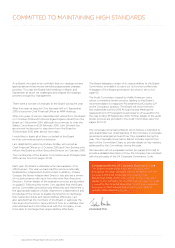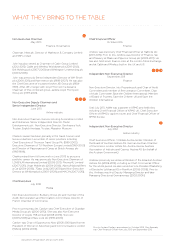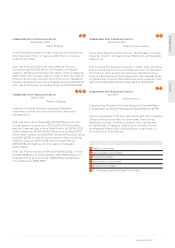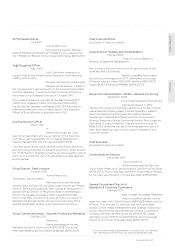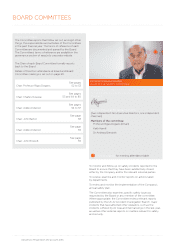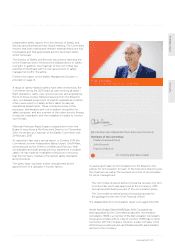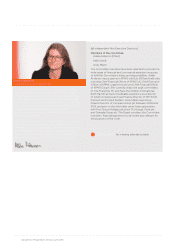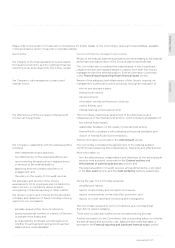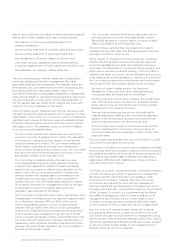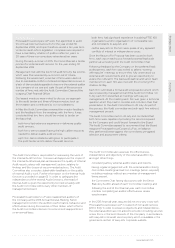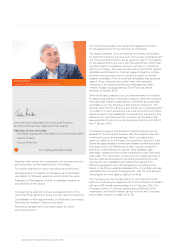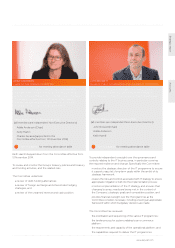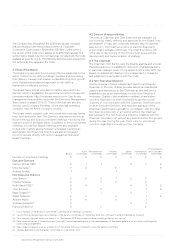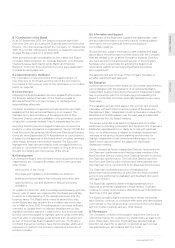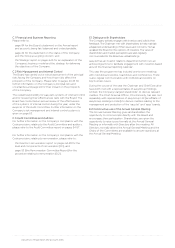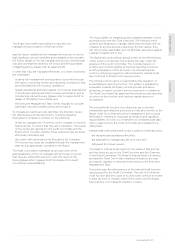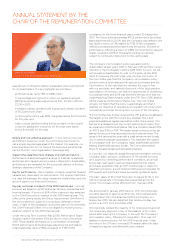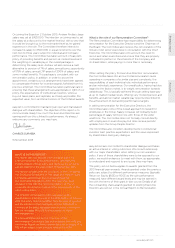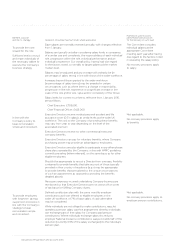EasyJet 2015 Annual Report Download - page 60
Download and view the complete annual report
Please find page 60 of the 2015 EasyJet annual report below. You can navigate through the pages in the report by either clicking on the pages listed below, or by using the keyword search tool below to find specific information within the annual report.
56 easyJet plc Annual report and accounts 2015
Corporate governance report continued
Specific items which the Committee looked at during the financial
year as part of and in addition to its main activities included:
• the treasury function and accounting treatment of
hedging transactions;
• the accounting treatment for property, plant and equipment;
• the accounting treatment of share-based payments;
• the management of change initiatives in the business;
• information security capabilities, policies and procedures,
including mitigations around cyber attacks and incidents; and
• the preparation for making a viability statement.
Financial reporting and significant financial judgements
The Committee assesses whether suitable accounting policies
have been adopted and whether management has made
appropriate estimates and judgements. For example, during the
financial year, the Committee reviews the level of provisions and
accruals recorded which are judgemental in nature. The
Committee reviews accounting papers prepared by management
which provide details on significant financial reporting judgements.
The Committee also reviews reports by the external auditors on
the full year and half year results which highlight any issues with
respect to the work undertaken on the audit.
The Committee reviews financial issues through discussion with
management and the external auditors and comparison to other
organisations. The number of such issues currently considered as
significant are, however, limited given easyJet’s relatively simple
business model and group structure which are unencumbered
with legacy issues. The significant issues considered in relation
to the accounts are detailed below:
• The Committee reviewed the maintenance provision at the
year end. A number of judgements are used in the calculation
of the provision, primarily pricing, utilisation of aircraft and
timing of maintenance checks. The Committee addressed
these matters using reports received from management
which underpin the basis of assumptions used. The Committee
also discussed with the external auditors their review of the
assumptions underlying the estimates used.
• The Committee considered whether the carrying value
of goodwill and landing rights held by easyJet should be
impaired. The judgement in relation to impairment largely
relates to the assumptions underlying the calculation of the
value in use of the business being tested for impairment;
primarily whether the strategic plan is achievable and the
overall macroeconomic assumptions which underlie the
valuation process. The Committee addressed these matters
using reports received from management outlining the basis
for assumptions used. The strategic plan used in the
calculation was presented to the Board.
• The Committee considered the key treasury transactions, and
the application of hedge accounting. easyJet hedges forward,
on a rolling basis, between 65% and 85% of the next 12
months anticipated fuel and currency requirements and
between 45% and 65% of the next 12 months’ anticipated
requirements. Significant exposure relating to the acquisition
cost of aircraft is also managed through the use of foreign
currency forward exchange contracts where 90% of the next
two years forecast requirement is hedged. easyJet does not
operate any other significant derivative financial instruments.
However, this area remains significant due to the quantity of
fuel and exchange rate hedges.
• The Committee reviewed the level and calculations of key
accruals and provisions which are judgemental in nature.
Specifically the area of customer claims in respect of flight
delays, cancellations and Air Passenger Duty.
The Committee is satisfied that the judgements made by
management are reasonable, and that appropriate disclosures
have been included in the accounts.
At the request of the Board, the Committee also considered
whether the Annual report and accounts was fair, balanced
and understandable and whether it provided the necessary
information for shareholders to assess the Group’s position and
performance, business model and strategy. The Committee is
satisfied that, taken as a whole, the Annual report and accounts
is fair, balanced and understandable. In reaching this conclusion,
the Committee considered the overall review and confirmation
process around the Annual report and accounts, including:
• the input of subject matter experts, the Executive
Management Team and other senior management and,
where applicable, the Board and its Committees;
• the processes and controls which underpin the overall review
and confirmation process, including the verification process
being carried out by an internal financial controls specialist
(independent of the Finance function);
• Internal Audit providing assurance over the audit trail for
material data points relating to the non-financial statement
aspects of the Annual report and accounts, and external
audit providing assurance over the accounts; and
• the Committee itself, as part of a continuous improvement
process, emphasising to contributors the importance of
providing a balanced view, especially in relation to the more
subjective areas.
The Committee was provided with, and commented on, a draft
copy of the Annual report and accounts.
In carrying out the above processes, key considerations included
ensuring that there was consistency between the accounts and
the narrative provided in the front half of the annual report, and
there was an appropriate balance between the reporting of
weaknesses, difficulties and challenges, as well as successes,
in an open and honest manner.
Risk management and internal control
The Board, as a whole, including the Audit Committee members,
consider the nature and extent of easyJet’s risk management
framework and the risk profile that is acceptable in order
to achieve the Company’s strategic objectives. The Audit
Committee has reviewed the work done by management,
the Committee itself and the Board on the assessment of the
Company’s principal risks, including their impact on the prospects
of the Company. As a result, it is considered that the Board
has fulfilled its obligations under the Code in relation to risk
management and internal controls. Further details on the
Company’s principal risks and uncertainties and their impact
on the prospects of the Company are set out on page 24-29.
easyJet’s system of internal controls, along with its design
and operating effectiveness is subject to review by the Audit
Committee, through reports received from management, along
with those from both internal and external auditors. Any controls
deficiencies identified are followed up with action plans tracked
by the Committee. Further details of risk management and
internal control are set out on page 63.


